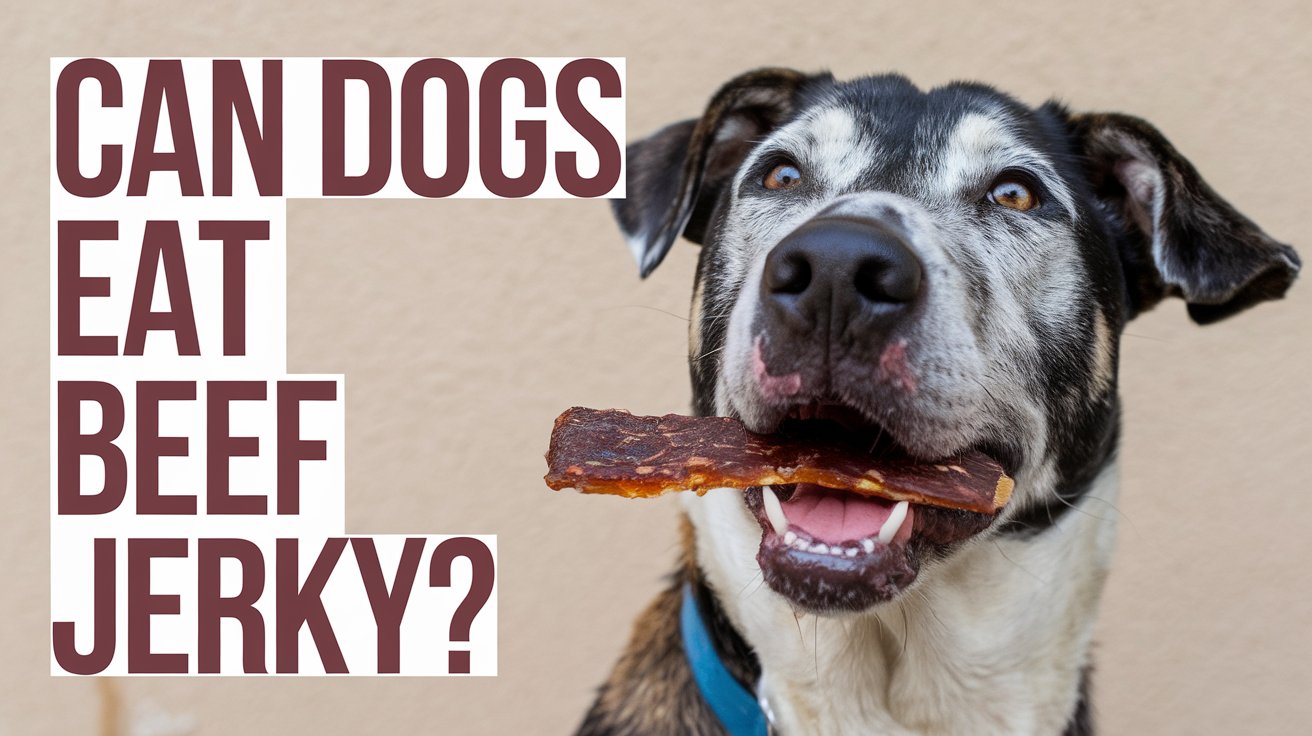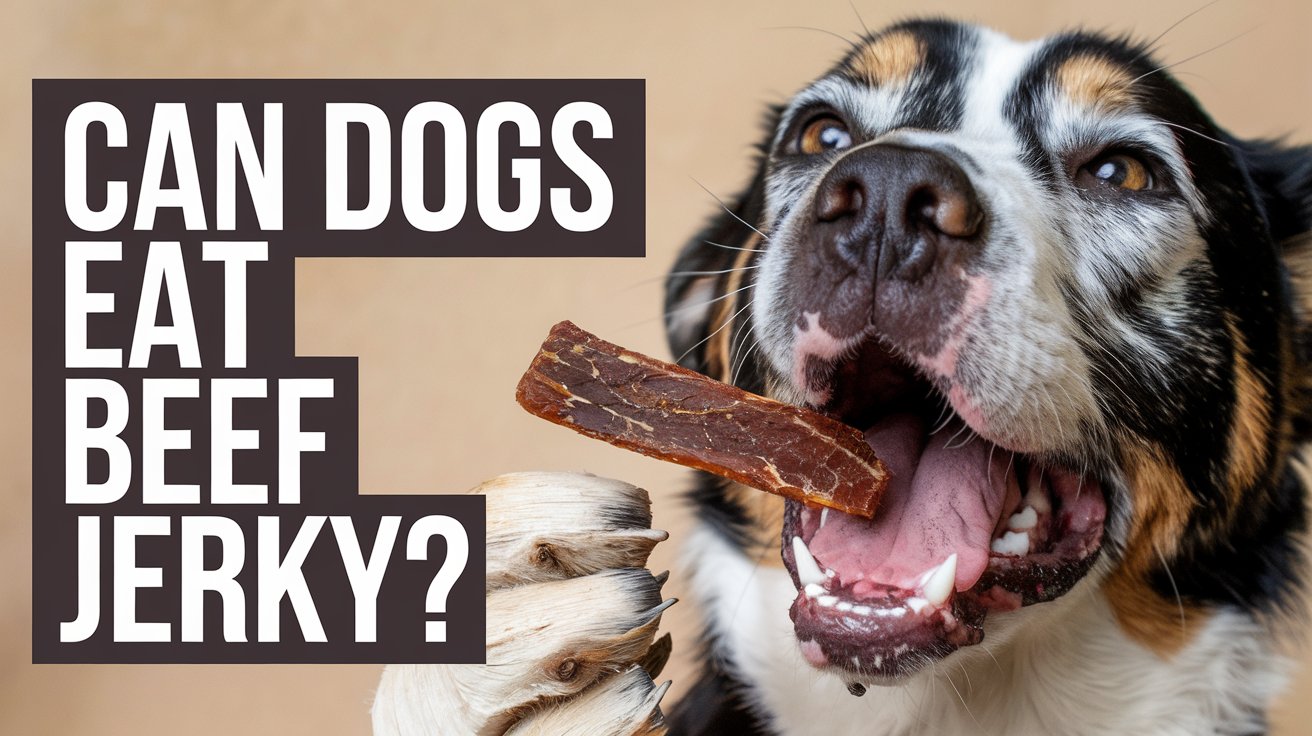
Can Dogs Eat Beef Jerky? Understanding the Risks and Benefits
As pet owners, it’s natural to want to share your favorite snacks with your dog. Beef jerky, a popular snack for humans, may seem like a tempting treat for your canine companion. But before you toss a piece of jerky to your dog, it’s important to ask: Can dogs eat beef jerky?
While beef jerky may seem harmless, it comes with certain risks and concerns for your dog’s health. The primary issue isn’t the beef itself, but the way jerky is prepared for human consumption. Seasonings, preservatives, and high levels of sodium are common in commercial beef jerky and can pose dangers to your pet. In this article, we’ll explore the safety of giving beef jerky to dogs, what ingredients to avoid, and whether homemade jerky could be a safer alternative.
Is Beef Jerky Safe for Dogs?
In its simplest form, plain beef jerky made from lean cuts of beef may not seem harmful. After all, dogs are carnivores and beef is a protein source that many dogs enjoy. However, the key to understanding whether beef jerky is safe lies in its preparation. Most store-bought jerky is loaded with ingredients that are not suitable for dogs, such as:
- High sodium content: Excessive salt can lead to sodium poisoning in dogs, causing symptoms like vomiting, diarrhea, tremors, and even seizures in severe cases.
- Spices and seasonings: Ingredients like onion powder, garlic, black pepper, and chili powder are common in jerky but are toxic to dogs and can cause gastrointestinal distress or more serious health issues.
- Preservatives: Chemical additives used to prolong the shelf life of jerky may not be safe for dogs. These additives can lead to digestive upset and long-term health concerns.
- Sugar: Many jerky brands add sugar or honey, which can contribute to obesity and dental problems in dogs.
For these reasons, while dogs can technically eat plain beef, the majority of commercial beef jerky products are not safe for canine consumption. If your dog ingests store-bought jerky containing harmful ingredients, it’s important to monitor them for signs of illness and contact your vet if symptoms appear.
What Happens If a Dog Eats Beef Jerky?
If your dog accidentally eats a small piece of plain beef jerky with minimal seasoning, they might be fine, especially if it doesn’t contain any toxic ingredients. However, if the jerky is heavily seasoned, salted, or contains preservatives like nitrites, you may notice the following symptoms:
- Excessive thirst and urination due to high salt content
- Vomiting or diarrhea
- Lethargy or restlessness
- Abdominal pain or bloating
- Muscle tremors or seizures in extreme cases
Dogs are much more sensitive to salt and certain spices than humans, so even a small amount can lead to discomfort or more severe reactions. If you’re unsure about the ingredients in the jerky your dog consumed, it’s best to consult your veterinarian to determine if any action is needed.

Is Homemade Beef Jerky a Safe Option for Dogs?
If your dog loves the taste of beef, homemade beef jerky can be a safer alternative to store-bought versions. When making jerky at home, you have full control over the ingredients and can avoid harmful additives, preservatives, and excessive salt. Here are some guidelines for making dog-friendly beef jerky at home:
- Use lean cuts of beef: Select lean cuts of meat with little fat, as fat can go rancid more quickly and isn’t as healthy for your dog.
- Skip the seasoning: Dogs don’t need spices for flavor. Stick to plain beef without any salt, garlic, onion, or other seasonings that could harm your dog.
- Dehydrate the beef: Use a food dehydrator or your oven to slowly dry the meat. Dehydration removes moisture, making it less likely to spoil.
- Store properly: Keep homemade jerky in an airtight container in the fridge to prolong its shelf life. Without preservatives, homemade jerky won’t last as long as commercial versions, so be mindful of spoilage.
Homemade jerky can be a delicious and safe treat for your dog when prepared correctly. However, as with all treats, moderation is key. Beef jerky should be an occasional snack, not a regular part of your dog’s diet.
Potential Health Risks of Beef Jerky for Dogs
Even with homemade jerky or natural varieties, it’s important to understand the potential risks that beef jerky poses to dogs.
- High protein and fat content: While dogs need protein, too much can lead to weight gain and pancreatitis, especially if the jerky contains high levels of fat.
- Choking hazard: Jerky can be tough and chewy, which may present a choking risk, especially for smaller dogs or those who tend to gulp their food without chewing thoroughly.
- Dehydration: High sodium levels in store-bought jerky can cause dehydration. If your dog eats jerky regularly, they may not drink enough water to compensate for the salt intake, leading to long-term health issues.
- Nutritional imbalance: Beef jerky is not nutritionally complete for dogs. Regular consumption can lead to imbalances in their diet, particularly if it replaces their regular food.
These risks highlight why it’s important to offer beef jerky as an occasional treat rather than a daily snack. Always prioritize a balanced and complete diet designed specifically for your dog’s needs.
Can Dogs Eat Beef Jerky Meant for Humans?
While plain, unseasoned beef jerky might seem harmless, jerky intended for humans is generally not suitable for dogs. Human jerky products are designed to appeal to our taste buds, meaning they often contain high levels of salt, sugar, and spices—none of which are healthy for dogs. Additionally, some beef jerky brands use artificial flavorings and preservatives that can have toxic effects on dogs.
In rare cases, a small piece of plain jerky may not cause any immediate harm, but it’s not a risk worth taking. Feeding your dog beef jerky meant for humans, even in small amounts, can lead to serious health complications over time.
Alternatives to Beef Jerky for Dogs
If you’re looking for safe, healthy alternatives to beef jerky for your dog, there are plenty of options to consider:
- Commercial dog jerky: Many pet food brands make jerky specifically for dogs, using safe ingredients without harmful additives. Look for brands that use single-ingredient, natural beef jerky with no added salt or preservatives.
- Dehydrated dog treats: You can find a variety of dehydrated treats made from other meats like chicken, turkey, or fish that may be safer for dogs.
- Fresh meat treats: If you want to give your dog a special treat, small pieces of cooked, unseasoned meat can be a healthy option. Just be sure to avoid any seasoning, bones, or fatty cuts.
- Freeze-dried meat treats: These are often made without any additives and retain the natural nutrients found in meat. They are a great alternative for dogs that enjoy the taste and texture of jerky.
By choosing healthier alternatives, you can provide your dog with a tasty snack that doesn’t compromise their health.
Can Dogs Eat Beef Jerky?
In summary, while dogs can technically eat beef, the jerky made for human consumption is not a safe option. The high levels of salt, seasonings, and preservatives in commercial beef jerky can lead to health issues like dehydration, digestive upset, and in extreme cases, sodium poisoning. For those who want to treat their dogs to a beefy snack, homemade jerky or jerky products specifically designed for dogs are much safer choices.

Frequently Asked Questions
Is beef jerky toxic to dogs?
Beef jerky can be harmful to dogs, especially if it contains high levels of salt, spices, or preservatives. It’s not toxic in small amounts, but it can lead to health problems if consumed regularly.
What should I do if my dog eats beef jerky?
If your dog eats beef jerky that contains harmful ingredients like garlic, onion, or excessive salt, monitor them for symptoms such as vomiting, diarrhea, or excessive thirst. Contact your veterinarian for guidance if you notice any concerning symptoms.
Can I give my dog homemade beef jerky?
Yes, homemade beef jerky can be a safe treat for dogs if it’s made without salt, spices, or preservatives. Always use plain, lean cuts of beef and store the jerky properly to avoid spoilage.
Why is sodium dangerous for dogs?
Dogs are much more sensitive to sodium than humans. Consuming high-sodium foods like beef jerky can lead to dehydration, increased thirst, vomiting, and in severe cases, sodium poisoning.
Are there safe jerky treats for dogs?
Yes, many pet stores offer jerky treats made specifically for dogs. These treats are typically free from harmful additives and made with safe ingredients that cater to a dog’s dietary needs.
Can dogs eat beef sticks or Slim Jims?
No, beef sticks and Slim Jims are processed snacks that contain high levels of salt, spices, and preservatives, which are unhealthy and potentially dangerous for dogs.
Conclusion
Beef jerky may be a popular snack for humans, but it’s not the best choice for dogs. With high sodium levels, toxic seasonings, and preservatives, most commercial jerky products can pose serious health risks to your dog. If you want to share a beefy snack with your dog, consider making plain, homemade jerky or choosing jerky treats specifically designed for dogs. By being mindful of what goes into your dog’s treats, you can keep them healthy and happy without sacrificing their love for tasty snacks.

I’m Haseem Ali, a passionate writer focused on dog diet, health, training, lifestyle, and care. I’m dedicated to sharing expert advice and practical tips to help fellow dog owners provide the best for their furry friends. When I’m not writing, I enjoy spending time with my own dogs and exploring new pet-friendly activities.
